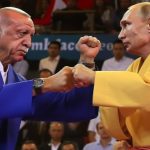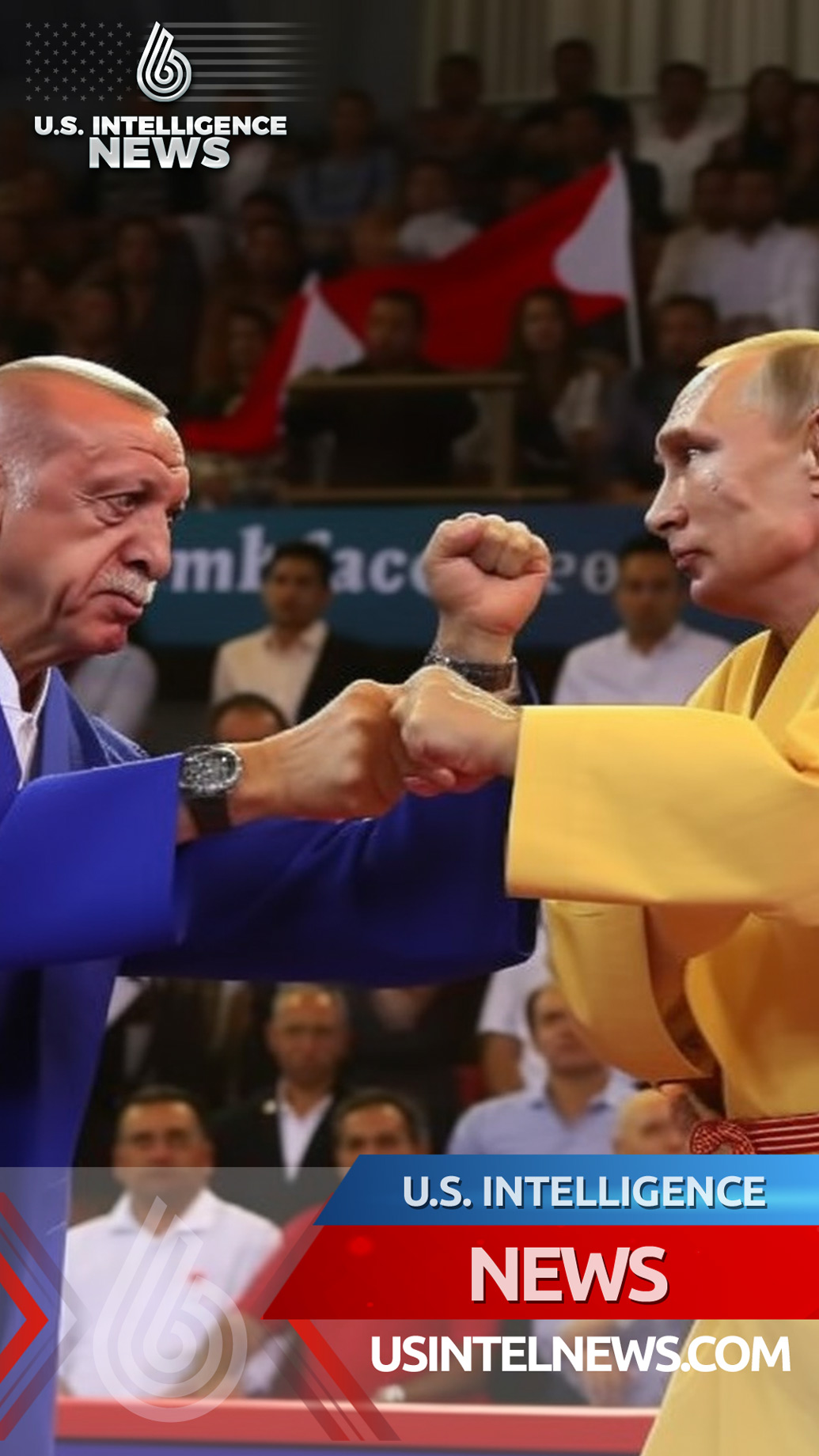
The U.S. Intelligence Community
Via Teleconference
9:20 A.M. EST
MODERATOR: Good morning, everyone. Thanks so much for joining us on this background briefing. We’re going to share some additional information about the United States’ successful efforts to secure the release of Brittney Griner.
Just to start with some ground rules before we dive in: The call is going to be on background, attributable to “senior administration officials.” It’s going to be embargoed until the end of the call.
Not for attribution but for everyone’s awareness, our speakers this morning are [senior administration official] and [senior administration official].
I’ll now turn it over to [senior administration official], who will provide some important information for you all and this good news. And then he’ll turn it over to [senior administration official]. So — and then we’ll take a few of your questions.
So, with that, I’ll give it over to [senior administration official].
SENIOR ADMINISTRATION OFFICIAL: Thank you so much. And thanks to all of you for joining us this morning, especially on pretty short notice.
I’ll cut to the chase. After months of being wrongfully detained under intolerable circumstances, Brittney Griner is on her way home to her wife Cherelle and her family.
We can confirm that Brittney is in good health and that she is being offered a wide range of support options following her time wrongfully detained.
Let me start by putting today in context. Throughout this administration, President Biden has prioritized the safe return of all Americans held hostage and wrongfully detained abroad. We have, as an administration, been gratified and proud to celebrate the return home of American hostages and wrongful detainees from Afghanistan, from Burma, from Haiti, from Russia, from Venezuela, from West Africa, and from other parts of the world in cases that we have quite deliberately kept discreet for particular reasons.
Throughout our work in this area, we have engaged extensively with families of detained Americans, as well as families of freed Americans, as well as advocates for these causes. And that’s, again, truly in the very first days of this administration.
I would also emphasize that in each particular case, as we worked through the very challenging circumstances and complications on the way to bringing someone home, we have continued to engage with families and provide them with regular updates on our efforts to bring their loved ones home.
Now, today’s news — Brittney’s safe return home — is the product of months and months of painstaking negotiations that ultimately, in their success, reflected the culmination of extraordinary efforts across the U.S. government.
As the Secretary of State said publicly back in July, we had been and continue to engage in difficult negotiations with Russia for the release of both Brittney and Paul Whelan, who is very much on our minds today and whom I’ll return to momentarily. Through the summer, into the fall, we followed up on our initial proposal that the Secretary of State referenced at the time with constructive alternatives.
Finally, in recent days, we were able to reach agreement on an option to secure Brittney’s release, and the President — President Biden made the difficult decision to accept that option because it resulted in the safe return home of an American. That is always our goal, of course: Get wrongfully detained Americans home safely, then keep working for the return of others.
And more specifically, through multiple, multiple engagements, the Russians made clear that the only route to securing Brittney’s return was the release of a Russian national, Viktor Bout.
As many of you know by this point, Bout has been in U.S. detention for over 12 years. He was convicted in 2011. He’s been serving his sentence, and he was scheduled for release in 2029. Nothing can remove the stigma of his guilty conviction in the U.S. justice system where, I would emphasize, he received due process of law, access to counsel, and a whole host of other rights and protections that Brittney was, appallingly, denied in the sham proceedings she faced in Russia. Nothing can change the fact that Bout has spent over 12 years behind bars in U.S. custody, paying a price for his crimes.
In the last 48 hours, as this has all come together, Brittney was moved from the penal colony, where she was being held, to Moscow. And this morning, she was brought to the United Arab Emirates, where she was met by U.S. officials. We, as a government, extend our deepest appreciation to the UAE who assisted in facilitating the transfer today.
Now, as we speak, Brittney is en route back to the United States where she will be reunited with her family and, as I mentioned, will be offered a wide range of additional support that the U.S. government provides to returning hostages and wrongfully detainees.
The President was with Brittney’s wife, Cherelle, this morning to relay the very good news and indeed, as you all know at this point, to speak with Brittney from the tarmac in the UAE.
I want to speak directly to the very challenging nature of all of this, even as we, of course, celebrate Brittney’s return. Simply put, negotiations for the release of wrongful detainees are often very difficult, in part because the price paid for an American’s freedom can be steep, and in part because the immediate results of this work can feel unfair or arbitrary.
So, while we celebrate Brittney’s homecoming, we remain committed to seeing Paul Whelan likewise released. We have been raising Paul Whelan’s case with the Russians since the earliest days of this administration.
Yesterday, Paul’s extraordinary sister was visited in person by a senior U.S. government official to share and talk through at length the news about Brittney. I would also emphasize that the President has made clear to the Whelan family that when they are ready, he is eager to personally convey his commitment to Paul’s case and his resolution to keep them informed of our efforts.
I would add that another senior U.S. official spoke at length today with Paul from prison and talked through today’s news.
Through every step of the process to secure Brittney’s release, we, as a government, have sought to bring Paul Whelan home as well. We did so in good faith with the Russians and proposed multiple different options. Regrettably, due to the nature of the sham espionage charges Russia levied against Paul, the Russians have treated — continue to treat his situation differently from Brittney’s and rejected each and every one of our proposals for his release.
So I want to be very clear: This was not a situation where we had a choice of which American to bring home. It was a choice between bringing home one particular American — Brittney Griner — or bringing home none.
We will never relent until we bring Paul home, too, along with other Americans held hostage and wrongfully detained globally. And at the same time, we are deeply relieved, gratified that today we are bringing Brittney Griner home to a family that loves her, a team that misses her, and a country that has marveled at her strength and courage.
I also want to thank those outside government who have engaged with us constructively and worked to improve Griner’s conditions while detained and to support government efforts to get — to reach this result, including Governor Bill Richardson, as well as a number of others who’ve shown a great deal of care and concern about this case.
Finally, I want to emphasize that this administration sees our responsibility in this area as a twofold challenge: to resolve current cases, like Brittney’s, by bringing Americans home; and to prevent and deter future cases from ever occurring in the first place.
We’ve had some pretty remarkable successes in the first category, as an administration, including in the wide range of countries around the world I mentioned earlier.
I want to emphasize right now that we’re also working tirelessly on the second piece. That is why President Biden issued an executive order this summer authorizing sanctions and visa prohibitions against those who are linked to hostage-taking and wrongful detention. It’s why Secretary of State Blinken has put U.S. diplomatic weight behind a Canadian-led initiative to bolster the international norm against arbitrary detention and to build a coalition to make the use of human beings as political pawns a thing of the past. And it’s why the State Department introduced, this summer, the “D” for wrongful detention indicator, which warned, even more starkly and clearly, Americans against traveling to countries where the threat of enduring the horrific experience that Brittney has been through looms particularly large.
Now I’ll ask my colleague, [senior administration official], to share a bit of color from today’s events before my colleague and I take a few of your questions.
SENIOR ADMINISTRATION OFFICIAL: Thanks, [senior administration official], for the detailed rundown. And, again, I appreciate everybody jumping on the call on such short notice. Again, as you can tell, it’s a very fast-breaking event, but was able to talk to Ambassador Carstens to get a few details that we can provide.
As you all well know, Roger was able to greet BG on the tarmac upon her release this morning, specifically to let her know that he was there to bring her home and was there on behalf of the President and Secretary Blinken.
As you all know, BG has gone through quite an ordeal. That said, you know, in an extremely upbeat mood, all smiles, and extremely grateful for all the efforts, both USG and outside the government, that has been put on to get her home. Also expressed that she is very much looking forward, obviously, to getting home to her wife Cherelle, her family and friends, and the broader WNBA team.
Aside from that, for privacy reasons, we’re not going to get into too much more. But, again, appreciate everybody on this call, our Emirati partners for helping to broker this transaction, and the broader U.S. government for all the efforts to get BG home.
MODERATOR: With that, we’ll start taking questions.
Q Hi, thanks so much for doing the call. A couple of questions. One, when did it become clear that they would only accept the one-for-one offer? And have the Russians committed to continue the negotiations on this matter? Will they continue to negotiate for Paul? And how can the U.S. provide anything else, given they have given the top incentive, Viktor Bout, already?
And then, if I could ask: The Saudis are claiming they have played a role in this. Can you speak to that at all? Thank you.
SENIOR ADMINISTRATION OFFICIAL: Yeah, thanks for the good questions. So, maybe I’ll take them in a slightly different order.
So, there are a number of governments and countries that, throughout the horrific ordeal that Brittney has been through and the horrific ordeal that continues for Paul Whelan, we have asked to convey just how serious we are about resolving these cases once and for all. And I’ll leave the details of that out.
But I would say that we do engage with a wide range of countries so that the Russians hear from a wide range of sources about our commitment to resolving these and what a priority that is.
Again, I’ll probably say a little bit vaguer than you might like, Jennifer, but it became clear in recent weeks, I would say, that the choice was, as I put it before, which is that it was a choice to bring Brittney Griner home right now or bring no one home right now. And that was despite efforts that, as you know, go back weeks and months to try to secure what we wished we’d been able to secure today, which is two Americans coming home. But we celebrate one coming home, and we keep working to bring Paul and other Americans wrongfully held elsewhere.
I think we have every reason to expect that the channel will remain open to continue to negotiate for Paul Whelan’s release. The Russians know, directly from us in multiple channels, how unacceptable we find his detention, how urgent we regard his release, and how committed we are to breaking through the impasse and finding ways that will achieve the result for him that we’re so glad to achieve — to have achieved for Brittney today.
Q Yes, I have a couple of questions. What precedent does this set for the future, beyond the efforts for Paul Whelan? Because we understand that the United States, for decades, have said they’re not in the negotiation process for hostages. But what precedent does this set?
And when it comes to Paul Whelan, does this jubilation from the White House, from the nation make it harder to bring him home? Because, at first, the thought was that if everyone showed a push for Brittney Griner, that she would be viewed as a pawn. What say you to both of those, please?
SENIOR ADMINISTRATION OFFICIAL: Yeah, thanks for the good questions. So, look, I would say, on the first one, that administrations have long resisted, wherever possible, releasing individuals early from our justice system who’ve earned their time in our law enforcement system.
And at the same time, the administrations before ours also made exceptions to that in extraordinary and rare cases where that had proven, through extensive negotiations, the only way to bring an American home.
Now, given how extremely rare this is, any inference that somehow this has become the norm would be mistaken. And I don’t think governments around the world would be wise to draw that inference. But in the rare case when there is an imperative to bring Americans home, which is a real priority for this President, there sometimes are no alternatives left and a heavy price has to be paid.
You know, I guess I would say that, with respect to Paul Whelan, we are trying to do everything in how we approach everything possible to bring him home. And to the extent there’s jubilation today, it is very much tempered by a real consciousness of how unacceptable his circumstances are and how committed we are to finding the way to break through and bring him home.
And, of course, there is great relief in Brittney coming back. But I think what the Russians have heard from us, privately and publicly, and what they will see today is our rejection of the way in which they have treated him as they put him through sham proceedings that convicted him of trumped-up espionage charges, and our insistence that we find a way to resolve the situation and get him home where he belongs. They’re going to continue to hear that until we reach a point where he too is coming home.
Q Hey, guys, thanks for doing this. Two questions. [Senior administration official, first on — several weeks ago, there was some indication from a top Russian diplomat that things looked like they were improving. You all, in the U.S. government, shot that down and said that was not true. It sounds like maybe it was true though, at the time, and you just didn’t want to talk about it. Could you talk a little bit about, sort of, you know, kind of how things — how and why you think things changed?
And then if you could talk a little bit more about the UAE. You talked about — somebody, I think, there just said the UAE helped — maybe [senior administration official] said the UAE helped to broker the deal. Were they just a transit point? Or did they — were they actively involved in the, you know, discussions with the Russians that led to this?
SENIOR ADMINISTRATION OFFICIAL: Yeah, thanks, Mike. I’ll take them in the reverse order. So, I think our gratitude is with the UAE for providing that important transit site to facilitate the exchange.
Now, I would emphasize what I said before, which is we have leaned on countries around the world at various times in recent weeks and months to convey to the Russians how serious we’ve been about resolving wrongful detention matters. And we appreciate when those countries raise those issues as we’ve requested.
But I think today our real focus is on the way in which the Emiratis provided a site where this could occur, as it did just a couple hours ago.
And then, you know, I’ll zoom out slightly on the first question, but I’ll just say this: What is said by the Russians publicly, whether it’s the Russian government or Russian media, often does not match what, in fact, is occurring in private channels as we work to resolve these types of issues or, in some cases, talk about other matters where appropriate. And we tried to be very candid with all of you and with the American public about that fact, even if sometimes things can get made true later by other developments. But we try to be candid that there should be a real weariness about what the Russians say, because it does not reflect reality sometimes.
I’ll leave it there.
Q Hey, guys, thanks very much. Let me go back to April’s line of questioning. And perhaps these are obvious questions that you’ve tried to answer a little bit, but I want to just be specific about them.
How was it acceptable to trade a woman who is wrongfully detained for a criminal who is so notorious he has the nickname “The Merchant of Death”? And given the notoriety of Bout, how do you avoid governments looking around the world and thinking, “Well, geez, if I just take one of theirs, we can get back someone even bigger that’s one of ours?” Thanks.
SENIOR ADMINISTRATION OFFICIAL: Yeah, thanks, Nick. So I guess we start by asking ourselves this question: How is it acceptable for someone like Brittney Griner to be put through sham proceedings and forced to spend, as she was sentenced to, nine years in a Russian penal colony in horrific circumstances that she did not deserve? And we regard that as unacceptable.
And from there, we work to make it not so and to bring Americans home. We try to explore all sorts of alternatives. We try to pay, of course, as little a price as possible. But ultimately, we feel there’s a moral obligation, frankly, as well as a policy obligation to bring people who are being held hostage or wrongfully detained home.
And I would also emphasize that the best antidote to future predicaments like that is avoiding these types of cases arising in the future. And so I’ll go back to what I mentioned earlier, which is we, as an administration, have been very committed to deterring and preventing the next set of potential cases from even happening to begin with. That’s why we’ve expanded the toolkit that we, as a government, can use to do that, including the abili- — expanding our ability to impose serious costs and consequences: sanctions, like visa bans, on governments, on non-state actors, on individuals associated with governments and non-state actors who are involved in hostage taking or in wrongful detention.
It is also why we have tried to make even starker, even clearer to the American people and the traveling public where they are at risk. So, in addition to the particular language of travel advisories that have long warned Americans about the risk of wrong detention by certain foreign governments, that “D” for wrongful detention indicator, which joined a previous “K” for kidnapping indicator, and has been applied to six countries, are a — that represents part of that effort to guide Americans away from the choices that can land them and us, as a government, in this type of very challenging predicament in the first place.
Q Yes, hi. A couple questions. I want to get a sense of when exactly did President Biden make the decision. How was the one-or-none option presented to him? And sort of on this Bout thing as well, has the NSC done any sort of assessment on an increase in security risks now that Bout would be back in Russia and able to do his work again? Thank you.
SENIOR ADMINISTRATION OFFICIAL: Yeah, thanks, Alex. So, I’ll answer each of those at a slightly higher level of generality, which is to say that the President personally has tracked closely, for months now, the negotiations — which, as I emphasized, are focused on getting both Americans held wrongfully detained in Russia home — and was kept updated on those.
And, ultimately, as it became clear what the choice was, as I’ve emphasized, that it was — which is bringing Brittney Griner home right now or bringing no American home from Russia right now — I would say it was in recent weeks that that materialized and that he made the very painful decision to provide the clemency necessary to get this done and indeed to get it done.
I would also say, on your second question, that as we work through different permutations and arrangements that are even conceivable to us in hostage and wrongful detainee negotiations — even before they necessarily are on the table with respect to a negotiating partner — we think that through from a wide range of angles and perspectives.
That includes the consequences of the type of release that was a prerequisite to getting Brittney home today, and we factor that into the analysis that we do on whether to proceed. And, of course, we share that with senior administration officials across the government.
And I think I’ll probably — probably leave it at that.
Q Hi, thank you. [Senior administration official], I just wanted to ask you to — just stepping back a little bit — what do you think this deal says about the ability of the United States and Russia to do business at a moment where, you know, not only is there this very intense tension over Ukraine and the speculation about the use of nuclear weapons, but also, you know, an increasing amount of other unrelated things that are grinding to a halt, like, you know, cooperation in the Arctic and New START and everything like that? What do you think this says about the broader U.S.-Russia relationship?
SENIOR ADMINISTRATION OFFICIAL: Yeah, thanks for the good question, Missy. So maybe I’ll say two things on that. One is that, of course, getting this done and reaching the result that is such a relief and that it brings Brittney home in no way
detracts from or minimizes how appalled we are at Russian aggression in Ukraine, the atrocities that have been reported from there, and the way in which the Russian military adventurism is disrupting peace and stability in Europe and, frankly, elsewhere.
But that leads me to point two, which is: Getting this done in the midst of that — much as getting Trevor Reed home a number of months ago, as this was unfolding as well — speaks to this administration’s commitment to and ability to work through the return of Americans held hostage or wrongfully detained with even some of the actors in the world we get along least well with. And that’s not just a coincidence. It is often the actors we get along with the least well who engage in the horrific, appalling practice of using human beings as pawns, as bargaining chips.
But if we’re going to bring them home, it means talking to those entities and it means ultimately working through an arrangement that gets Americans where they should be: with their loved ones at home.
And so that’s a couple of takeaways, Missy, that I hope are helpful.
Q Hey, thanks. Thanks so much. I wanted to just build on Missy’s questions there. In regards to, you know, reaching that agreement, in addition or beyond just showing what the administration’s effort, but does it signify that there is better dialogue in any way? Is there now, the fact that you’ve reached this agreement, some goodwill that can be employed to make agreements on other factors — some of the other matters that you were discussing before, such as Ukraine or some of these other big issues? Is there more opportunity for discussion in other areas?
SENIOR ADMINISTRATION OFFICIAL: So, I guess — here’s what I’d say, which is neither quite a “yes” or a “no” to that, but these were very targeted, very focused negotiations. They concerned one very important topic, but one narrow topic alone, which is: Americans who are being wrongfully detained in Russia.
And we are, of course, gratified to have achieved success in bringing Brittney home. And we do think, as I indicated before, it speaks to an ability to get this sort of thing done even when we are in the midst of very tough relations with a government like Russia. But I also want to emphasize that this was — this was targeted. This was focused as a dialogue.
I should use that as an opportunity to emphasize that we have briefed key partners, including Ukrainians, on this result so that they too understood that this was about one thing and one thing alone: resolving wrongful detention cases. And that there are many other issues that we have not broached with the Russians and would not broach with them out of sync with those sorts of partners.
Q Hi, [senior administration official]. Thank you so much for doing this. I was wondering if you could talk a little bit in more specifics about which American officials and which Russian officials were involved in the official channels, negotiations, and also as well about the specific role played by Governor Richardson and Mickey Bergman.
And then, more specifically, you mentioned that the U.S. had offered alternative options as part of these negotiations, so I’m wondering if you could talk a little bit about what else you were prepared to do and then, I guess, what else Russia would have wanted that could have also secured the release of Paul Whelan that perhaps the U.S. was not prepared to do. Thank you.
SENIOR ADMINISTRATION OFFICIAL: Thanks, Eric. And I’ll probably give less detail on each of those than you’d like, but I’ll take a stab at both, of course.
So, I’ll stay away from kind of getting into the details of who negotiated with whom because I want to leave that to the negotiators.
But I am very, very grateful for a wide range of parts of the U.S. government that collaborated on various pieces of this, from negotiations to the facilitation of the exchange that actually occurred today.
And as I indicated before, there’s gratitude from the government to outside advocates who raised their voices in support of Brittney, like Governor Richardson, who tried to be constructive in keeping us informed as to how they were thinking about the matter. And we appreciate those outside governments who care about these cases, just the way we care about them, and who worked (inaudible) to resolve them the way we were delighted to be able to do today.
It won’t surprise you, Eric, that I’m going to stay away from specifying alternatives discussed in sensitive negotiations. But I would just emphasize what I said before, which is: We explored a wide range of alternatives and permutations that we felt were, frankly, quite generous in resolving both cases as we sought so eagerly to do. And, ultimately, we were confronted by only the choice that I mentioned.
But I will leave those to negotiators to pick up on as we do what we need to do and what we will do, which is work tirelessly to get done the piece that remains, which is bringing Paul Whelan home too.
Q Hi, it’s Peter Alexander from NBC News, using Sally’s dial-in. Appreciate you guys doing this call. Could you help us with some of the details about the tick-tock, the timeline about when she would have departed from the penal colony, when she got to where, when she got to UAE?
And then, separately, upon Brittney’s arrival back in the U.S., specifically where she’ll be and what type of treatment — what the sort of process looks like, strategic debriefing and what happens for someone in a situation like this upon her return to the U.S.
If you could walk us through the timeline, including when Cherelle Griner would have got the indication and when she first flew back to the White House to meet with the President and how it was first communicated to her. Appreciate it.
SENIOR ADMINISTRATION OFFICIAL: Yeah, thanks, Peter. So, it was a couple of days ago that — consistent with where conversations were going with the Russians — they moved Brittney from the penal colony to Moscow in preparation for what occurred today. And then they flew her this morning to the Emirates where, as I mentioned, the exchange occurred.
She is now, as I indicated, in the air as she makes her return to the United States. She will be offered a wide range of support. A program has been developed, drawing on a tremendous array of expertise across the U.S. government, to help those returning from being hostage or being wrongfully detained deal with what they’ve been through and deal with where they are now.
And I will say I have spoken personally with returned detainees who’ve been through that process and who have indicated to me how valuable they find it, just how helpful it is to have expertise and guidance at adapting from just horrific circumstances — different forms of horrific circumstances, depending on where individuals have been held and how they’ve been treated, but nonetheless horrific circumstances — to what can be the daunting task of acclimating to a far better life, but nonetheless a life that’s become unfamiliar.
And so, Brittney will be, of course, offered that full range of services. It’s up to her as to whether to elect to take them. How long those last depend a bit on a person’s preferences and a bit on how the experts feel it is proceeding. And out of respect for her privacy, you probably won’t hear much from us as a government as to those next steps.
But it is important that folks realize that not only do we work hard to bring people home, but we work hard then to help them with that transition back to being home. And all of that is, of course, available to Brittney the way it is to every American that we bring home.
Q Thank you, everybody, for having this call this morning. I wanted to — I have a actually two-part question. One, Brittney Griner is an African American person, so do you know if she experienced any incidents, in particular, of racism whilst she was in prison?
Secondly, will the U.S. be learning more from her about what the prisoners held in Russia experience while being detained?
SENIOR ADMINISTRATION OFFICIAL: Yeah, thank you for those questions. And, look, we will be keen to learn whatever she’s comfortable sharing. She will obviously be treated with — as all who return in these circumstances do — with incredible dignity and respect. But if and when she is comfortable sharing that, we are, of course, eager to learn. It helps us as we — as we deal with these types of cases.
And I can only begin to imagine some of what it must be like to be an American held in a Russian penal colony, but she’s actually experienced it. And if and when she’s comfortable sharing that, we have a lot to learn, I’m sure, from her with respect to racism, with respect to whatever else she might have been subjected to in conditions that, as you all know, we believe she should never have been subjected to in the first place.
Q Hey, guys. Thanks for doing this. Just a couple quick ones. The Saudis are claiming credit alongside the UAE for helping facilitate the deal and that the Crown Prince was involved. Can you say what his role was?
And then, on Bout, I’m wondering — there’s some reports out of Russia that he was pardoned before he was sent out. Can you confirm if that’s true?
And then, just to get back to the broader question: If, you know, you found in these negotiations he wasn’t enough to kind of spring the release of Paul Whelan, do we feel like we have folks — you know, Russians detained here or leveraged — to negotiate a deal for Paul Whelan’s release? Can you kind of talk out the extent to which you’re worried that the deal — I mean, for the price for him has gone up?
SENIOR ADMINISTRATION OFFICIAL: Yeah, thanks. Maybe I’ll take the questions in reverse order. So, look, if we had exactly enough to bring Paul Whelan home, he’d be home today, too. It is an indication that we don’t right now, or at least in the Russians’ view, we don’t.
But that — it’s just a matter of continuing to negotiate and continuing to explore options and alternatives and generate a point at which we do bring him home.
But it is, of course, a concern to us that — any American remains in wrongful detention or held hostage is of concern to us. And this — and Paul is, of course, particularly on our minds, as I emphasized before, today of all days.
With respect to Bout, it’s an opportunity to emphasize what I said before, which is to be cautious of what you read from the Russians. But what has to happen in an instance like this is a act of clemency from the President, which ended Bout’s time in U.S. custody after the over 12 years he had spent in it, and it yielded his release sooner than his otherwise scheduled release of 2029. It is an act of clemency. And the guilt of his conviction remains.
And then, finally, on your first question, I think I’ll revert to what I said to Jennifer earlier, which is that in the course of getting to this happy result with respect to Brittney, and in the course of working to secure the release of Paul as we continue to do, we have and I’m sure we’ll continue to lean on partners around the world to work this through with us, to give us their ideas, and to impress upon the Russians how important it is to us to resolve these sorts of cases. And we appreciate when those partners do help us in those efforts. And I’ll leave it there.
MODERATOR: All right. And this concludes our call. Thank you all so much for the time. Take care.
9:57 A.M. EST
The post Background Press Call on the Release of Brittney<span class="dewidow"> </span>Griner appeared first on The White House.


 Russia Refocuses on Hybrid Operations in Moldova, Armenia, Georgia, and Baltic States
Russia Refocuses on Hybrid Operations in Moldova, Armenia, Georgia, and Baltic States  Bitcoin and Tether Self-Destruct: How Ethicoin is Redefining the Future of Ethical Finance
Bitcoin and Tether Self-Destruct: How Ethicoin is Redefining the Future of Ethical Finance  Kremlin’s High-Stakes Gambit: Secret Deals, a Presidential Double, and the Fight to Salvage Power in Syria
Kremlin’s High-Stakes Gambit: Secret Deals, a Presidential Double, and the Fight to Salvage Power in Syria  Putin’s Economic Gambit: Russia Aims for Global Oil Dominance Amid Sanctions Pressure
Putin’s Economic Gambit: Russia Aims for Global Oil Dominance Amid Sanctions Pressure 


